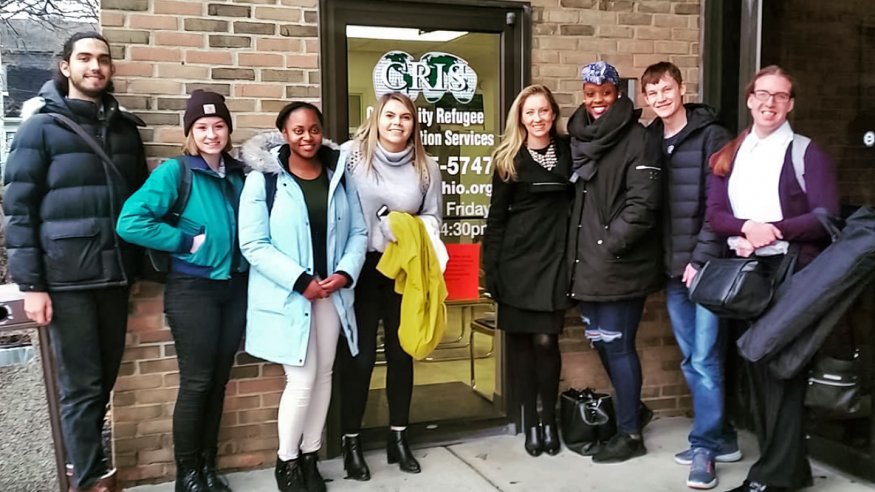
‘Documenting Africa’
Ohio Wesleyan Professor Collaborates on Teaching Project, Journal Article
DELAWARE, Ohio – Ohio Wesleyan University faculty member Mary Anne Lewis Cusato has expanded her course on immigration, “Fourteen Kilometers,” into a collaborative teaching project that broadens the impact of its lessons to include a new “Documenting Africa” website and a peer-reviewed journal article.
The project is a collaboration between Lewis Cusato, Ph.D., associate professor of World Languages and Cultures and co-director of the Palmer Global Scholars Program, and Nancy Demerdash-Fatemi, Ph.D., assistant professor of Art History at Albion College in Michigan.
The collaboration involved the educators teaching separate courses that, in their words, collectively “explored the artistic traditions and literary, journalistic, cinematographic, and visual representations of African peoples and cultures.”
“Students in both courses were encouraged to confront and ask difficult questions about the biases and mythologies that permeate Western perceptions about Africa, African peoples, and cultures; and to become attentive to the problems of history, misrepresentations, and the importance of historiographic revision,” they explain in their co-written article. It appears in the May 11 edition of The Journal of Interactive Technology and Pedagogy.
At Ohio Wesleyan, students in Lewis Cusato’s French-language course “Fourteen Kilometers: Mediterranean (Im)Migrations in Contemporary Francophone Cultural Expressions” completed three benchmark assignments to help them answer these questions:
- What does it mean to record an oral history responsibly and ethically and how do stylistics, such as camerawork and sound recording, affect such a project?
- What are the stakes of creating an outward-facing project, especially for cultural documents that represent or come from Africa?
- How do exhibition and translation – extensions of the original object(s) – affect the project?
Their fall 2018 course also included a trip to Columbus to meet with a French-speaking African immigrant who spent 11 years in a Ugandan refugee camp before being granted asylum in the United States. The meeting was made possible through Lewis Cusato’s connection with the nonprofit Community Refugee and Immigration Services (CRIS) organization.
Reviewing all of the materials they studied, discussions they had, and goals of sharing their learning more broadly, the students at Ohio Wesleyan and Albion worked to create the “Documenting Africa” website, which Lewis Cusato and Demerdash-Fatemi describe as “a multi-layered, multimodal, multifaceted narrative that emphasizes originality, individuality, reflection, sophistication, and art and knowledge alike.”
In addition to their journal article, “Experiential Approaches to Teaching African Culture and the Politics of Representation: Building the ‘Documenting Africa’ Project with StoryMapJS,” the two professors also discuss their collaboration and the lessons learned from it in an online discussion hosted by the Florida Digital Humanities Consortium.
In summing up the value of the collaborative project, Lewis Cusato says: “The great value of coupling a course with the creation of a digital humanities project [is] namely that it asks students to curate and create something visual, textual, technological, outward-looking, and helpful for others who might wish to explore the topic. The student literally becomes the teacher, and they emerge from the course experience having moved from input, from learning, to creation, to teaching, to output. So, in these ways, learning begets reflection and creation, engagement with resources begets the genesis of a new resource, and the cycle and the learning can continue.”
The “Documenting Africa” project was supported by funding from the Great Lakes Colleges Association and The Five Colleges of Ohio Mellon Digital Scholarship Award. Learn more about Lewis Cusato and Ohio Wesleyan’s Department of World Languages and Cultures at owu.edu/wlc.
Founded in 1842, Ohio Wesleyan University is one of the nation’s premier liberal arts universities. Located in Delaware, Ohio, the private university offers more undergraduate majors than many universities its size and competes in 24 NCAA Division III varsity sports. Through its signature program, The OWU Connection, Ohio Wesleyan teaches students to integrate knowledge across disciplines, build a diverse and global perspective, and apply knowledge in real-world settings. Ohio Wesleyan is featured in the book “Colleges That Change Lives” and included on the U.S. News & World Report and Princeton Review “best colleges” lists. Learn more at owu.edu.
